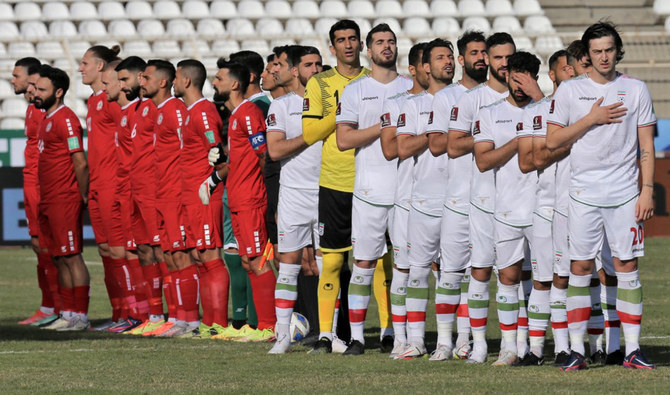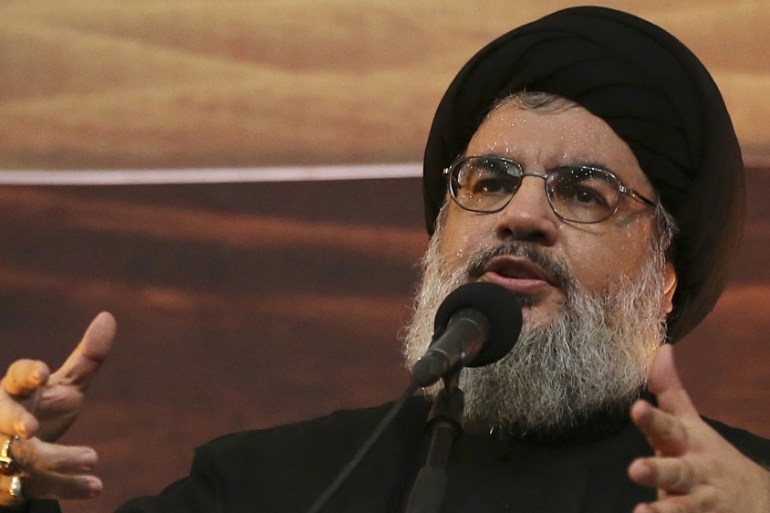الرئيس سليمان: نيترات الأمونيوم كانت لا تزال بالباخرة حينما كنت رئيساً ووُضعت في العنبر بعد مغادرتي بخمسة أشهر ولم يكن لدي معلومات …

by arabnews.com -- Najia Houssari -- BEIRUT: The Iranian national football team has visited Lebanon on several occasions to compete in the Asian qualifiers. But this week, the Iranian team arrived in a very different set of circumstances, playing Lebanon on Thursday amid a wave of political quarreling and accusations that Tehran is taking over the country and isolating it from its Arab surroundings. The match, which Iran won 2-1, had sparked a renewed sense of patriotism among the Lebanese for the World Cup 2022 qualifiers. The Lebanese goal, scored in the first half, put a smile on the faces of the Lebanese, who are drowning in misfortunes. But while the match sparked national pride among Lebanese supporters, many created fake social media accounts to support the Iranian team and the Wilayat Al-Faqih, the term used to describe the system of governance that Tehran has used since the 1979 Islamic revolution. Although most fans admit that the Lebanese team “lacks equipment, training, physical fitness, and overall readiness due to the financial, economic and institutional crises in Lebanon,” their hearts, as they said, are with the “Cedar men.” Even politicians encouraged the Lebanese national team.
Independent MP Fouad Makhzoumi wrote: “The hearts of all the Lebanese are with our national football team.” Activist Mounir Khater tweeted: “The vast majority of the Lebanese are united behind their national football team. The Lebanese love their country, except for a few whose minds have been plagued by ignorance, and the national concept has mixed with the sectarian concept.” The game took place at the Rafic Hariri Municipal Stadium in Sidon, southern Lebanon, but FIFA and the Asian Football Confederation ruled that fans were not allowed “for security reasons.” Sports experts regretted that this measure deprived the Lebanese team of its “motivation factor.” No television channel covered the game, with fans only able to watch it live on YouTube. FIFA consulted a private security company that had recently conducted an assessment of the security situation in Lebanon. “The report was based on the Tayouneh incident that took place in October,” said Hashem Haidar, head of the Lebanese Football Association.

by Al Jazeera - Beirut, Lebanon – Hezbollah leader Hassan Nasrallah has blasted Saudi Arabia for trying to stir instability in Lebanon amid a weeks-long diplomatic dispute between the latter and several Gulf countries. In a televised speech on Thursday, Nasrallah accused Saudi Arabia of violating Lebanese sovereignty and dismissed calls for the departure of embattled Information Minister George Kordahi. “Hezbollah supports the information minister’s position of not resigning,” Nasrallah said, adding that he also opposed the idea of Kordahi being sacked from his position. “Rejecting external dictates is one of the simplest manifestations of sovereignty.” The diplomatic crisis was sparked last month after video footage circulated online from an August interview in which Kordahi made critical remarks about the Saudi-led coalition’s war against Houthi rebels in Yemen.
The former game show host said the Iran-aligned Houthis are “defending themselves … against an external aggression”, earning praise from Iran-backed Hezbollah. In response, Saudi Arabia, the United Arab Emirates, Kuwait, and Bahrain recalled their envoys from Beirut and expelled their Lebanese ambassadors. Saudi Arabia, which considers Hezbollah a “terrorist” organisation, also banned all imports from Lebanon, accusing it of failing to take measures to “stop the export of the scourge of drugs”. Bahrain and the UAE have called on their citizens to leave the country, while Yemen’s internationally recognised government has also since recalled its envoy from Beirut. “[Hezbollah] made Lebanon an arena and a launching pad for implementing projects of countries that do not wish well for Lebanon and its brotherly people,” a Saudi statement issued on October 29 read.
اعتَرى القضاءَ اللبنانيَّ ما اعتَرى لبنان: اعتداءٌ مزدَوجُ المصْدَر مِن خارجِ السلكِ القضائيِّ ومن داخِله. ونَشأَ تواطؤٌ بين المصْدَرين حيث قُضاةٌ مُسيَّسون وطائفيّون وفاسِدون يَعمَلون لمصلحةِ المصدَرِ الخارجيّ، ويُنفّذون من الداخلِ أوامرَه، بل مؤامرَته على القضاءِ اللبنانيّ. والخطورةُ هنا مثلَّثةٌ: الأولى أنَّ الّذين يقومون بهذه الـمَهمّةِ ليسوا قضاةً صِغارًا في محكمةٍ ريفيّةٍ، إنّما قضاةٌ كبارٌ يَشغَلون مناصبَ رفيعةً في تراتبيّةِ السلطةِ القضائيّة. والثانيةُ أنّهم يَدرُون ماذا يَفعلون، ويَرتكِبون فِعْلتَهم عن سابقِ تصوّرٍ وتصميم، ما يَجعلُ فِعْلتَهم مزدوجةً: فسادٌ وخِيانة. والثالثةُ أنَّ الانقسامَ في القضاء، وبخاصّةٍ على مستوى مجلسِ القضاءِ الأعلى والنياباتِ العامّة، يأخذُ طابَعًا طائفيًّا ومذهبيًّا يُعطِّلُ عملَ القضاءِ على غرارِ تَعطيلِ عملِ مجلسِ الوزراء. هل يريدون أن يصبحَ القضاءُ أيضًا فِدراليًّا؟
صارت أمراضُ القضاءِ اللبنانيِّ مُـجَسَّمًا عن أمراضِ دولةِ لبنان: كانتوناتٌ مذهبيّةٌ. مَسٌّ باستقلاليّتِه من دون حَسْم. ازدواجيّةُ القرار. مخالفاتٌ من دونِ تأديب. تَمرّدٌ من دونِ إقصاء. ولاءٌ لقِوى خارجَ السلكِ القضائي. تَعدّي قضاةٍ على صلاحيّاتِ زملائِهم. تلاسُنٌ يَفيضُ وقاحةً وحِقدًا. إبْدالُ الـمِطرقةِ بالقَدَم. قضاةٌ ضِدَّ قضاة. محكمةٌ ضِدَّ محكمة. مرؤوسٌ ضِدَّ رؤسائِه. خطوطُ تماسٍ بين المرجِعيّاتِ القضائيّةِ ووزارةِ العدل. وجفاءٌ بين القضاءِ والسلطةِ الحاكِمة، إلخ...
Khazen History


Historical Feature:
Churches and Monasteries of the Khazen family

St. Anthony of Padua Church in Ballouneh
Mar Abda Church in Bakaatit Kanaan
Saint Michael Church in Bkaatouta
Saint Therese Church in Qolayaat
Saint Simeon Stylites (مار سمعان العامودي) Church In Ajaltoun
Virgin Mary Church (سيدة المعونات) in Sheilé
Assumption of Mary Church in Ballouneh
1 - The sword of the Maronite Prince
2 - LES KHAZEN CONSULS DE FRANCE
3 - LES MARONITES & LES KHAZEN
4 - LES MAAN & LES KHAZEN
5 - ORIGINE DE LA FAMILLE
Population Movements to Keserwan - The Khazens and The Maans
ما جاء عن الثورة في المقاطعة الكسروانية
ثورة أهالي كسروان على المشايخ الخوازنة وأسبابها
Origins of the "Prince of Maronite" Title
Growing diversity: the Khazin sheiks and the clergy in the first decades of the 18th century
Historical Members:
Barbar Beik El Khazen [English]
Patriach Toubia Kaiss El Khazen(Biography & Life Part1 Part2) (Arabic)
Patriach Youssef Dargham El Khazen (Cont'd)
Cheikh Bishara Jafal El Khazen
Patriarch Youssef Raji El Khazen
The Martyrs Cheikh Philippe & Cheikh Farid El Khazen
Cheikh Nawfal El Khazen (Consul De France)
Cheikh Hossun El Khazen (Consul De France)
Cheikh Abou-Nawfal El Khazen (Consul De France)
Cheikh Francis Abee Nader & his son Yousef
Cheikh Abou-Kanso El Khazen (Consul De France)
Cheikh Abou Nader El Khazen
Cheikh Chafic El Khazen
Cheikh Keserwan El Khazen
Cheikh Serhal El Khazen [English]
Cheikh Rafiq El Khazen [English]
Cheikh Hanna El Khazen
Cheikha Arzi El Khazen
Marie El Khazen